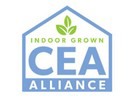The CEA Food Safety Coalition is expanding its mission to serve the broader needs of all controlled environment food growers.
“With a new name and mission, the new Controlled Environment Agriculture Alliance – ‘CEA Alliance’ – will expand its membership to serve growers delivering the freshest, best-tasting, and most nutritious fruits and vegetables to consumers, with the least environmental impact; reducing the use of water, land and other scarce resources; and employing the most rigorous practices to ensure the safety of our products,” said CEA Alliance Executive Director Tom Stenzel.
Members include a wide variety of both indoor vertical farms and greenhouse growers. The Board of Directors of the CEA Alliance includes:
- Marc Oshima, Co-founder and Chief Marketing Officer, AeroFarms
- Katie Seawell, Chief Commercial Officer, Bowery Farming
- Tim Cunniff, Co-founder, and Executive Vice President-Sales, Little Leaf Farms
- Todd Linsky, Superior Fresh/TLC
- Dinesh Babu, Vice President of Food Safety and Compliance, Revol Greens
- Matt Lingard, Vice President for Agriculture and Science, Bright Farms
- Dan Malech, Senior Vice President, Strategy & General Counsel, Plenty
The CEA Alliance will continue its support of unique food safety standards for indoor-grown produce but will expand its portfolio of services to include strong public policy advocacy, support for sustainability and climate-smart agriculture, and support of retail and food service companies in delivering differentiated produce to consumers.
Controlled environment growers employ a variety of agricultural production methods and technology to create optimal growing conditions, including indoor vertical farms and glass greenhouses with rigorous environmental controls. Growers utilize innovative technologies such as hydroponics, aeroponics, aquaponics, and soil-based systems to grow a wide variety of specialty crops.
Controlled environment produce is a distinct and rapidly growing category, offering benefits to consumers, the environment, communities, and the overall agricultural food system.
- Good for consumers. Controlled-environment produce sets the bar for quality, cleanliness, and availability, offering a differentiated option for consumers who care deeply about their eating experience and their families’ health. This includes rigorous standards for quality and freshness, as well as the highest standards for food safety. Growing year-round brings consumers consistency and reliability, with a supply chain unaffected by climate change and erratic weather conditions.
- Good for the environment. Controlled environment produce has important environmental benefits, including reduced use of water, land, and other scarce natural resources. Indoor growers use fewer or no pesticides, reduce food waste, and reduce carbon emissions from long-distance transportation by locating farms closer to markets.
- Good for communities. Controlled environment farming is creating a new generation of stable and high-quality agriculture jobs that are year-round, pay good wages, and offer a safe and comfortable working environment. CEA growers support both urban and rural communities, often bringing good jobs to economically challenged communities.
- Good for the food system. By eliminating seasonality and variability, increasing domestic production, bringing food production closer to the end consumer, and producing more outputs with fewer inputs, controlled environment farming will reduce the impact on the food system from climate events, supply shocks, geopolitical events, droughts, and other unknown events.
The CEA Alliance will work to establish consistent metrics for measuring and communicating these key benefits in collaboration with our stakeholders and in compliance with existing
recognized global standards. These metrics will be measurable, transparent, and verifiable, allowing companies to communicate credibly with consumers and other stakeholders about their operations.
“Transparency with our customers and end consumers is an important part of our culture,” Stenzel said. “Consumers can count on CEA growers to seek continuous improvement in growing the most sustainable, nutritious, and freshest produce possible, using the very highest standards for food safety and quality.”
“CEA growers aspire to be the fresh produce of choice for consumers while working with traditional outdoor growers to increase fruit and vegetable consumption,” Stenzel said. “Consumers worldwide need to increase their consumption of fruits and vegetables for health,
and CEA-grown produce will be an important ally of conventional agriculture in delivering that solution.”
The CEA Alliance previously worked with a retail advisory committee but will now add a new membership category for retail and food service companies, now joining with CEA growers, their business service providers, and government and academic researchers as key participants in the membership association.
“Together with our retail and foodservice partners, we provide a choice for consumers in the marketplace that meets their needs for the highest quality fruits and vegetables, grown in a way that shares their values for environmental sustainability, reduces the use of natural resources, and supports their communities,” Stenzel concluded.
The CEA Alliance recently supported the National Association of State Departments of Agriculture in adopting a policy position in support of investment in CEA agriculture. The association will host its first federal public policy meeting in February 2023 in Washington, DC, to brief policymakers about opportunities in the 2023 Farm Bill and future legislation to support consumers through controlled environment agriculture.
To learn more about the CEA Alliance and become part of the future of indoor crop agriculture, please contact Tom Stenzel, Executive Director of CEA Alliance, at [email protected].
For more information:
CEA Alliance 
www.ceafoodsafety.com
